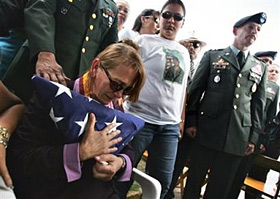 |
 |
 |
 News from Around the Americas | December 2005 News from Around the Americas | December 2005  
Cities Voice Opposition to War in Iraq
 John Yaukey - Gannett News John Yaukey - Gannett News


| | Norma Mendez, the mother of a U.S. Army soldier who was killed recently in Iraq, embraces an American flag which was ceremonially folded and given to her, at her son's burial, in Rincon, western Puerto Rico. The soldier, Antonio Mendez, age 22, was killed in a carbomb attack in Kirkuk, Iraq, on Nov. 11, according to Army authorities. (AP/Brennan Linsley) |
Washington - Cities don't make foreign policy.

But that hasn't stopped dozens of towns from Berkeley, Calif., to Chicago to Cambridge, Mass., from passing resolutions calling for withdrawal of US troops from Iraq.

The resolutions typically note the growing US military death toll, now more than 2,100, as well as the financial burden, approaching a quarter-trillion dollars. The Chicago City Council calculated it could pay more than 31,000 teachers for a year with its annual share of the war cost.

It's part of what polls indicate and social observers say is a growing antiwar sentiment among Americans now exhausted from the war, if not philosophically against it.

"I follow the news, and it's painful," said Michigan resident Deborah Regal, a member of the antiwar group Military Families Speak Out and the mother of a Marine in Iraq. "It just grinds you down to the point where you're very conscious of every day that passes because you know what the troops are going through."

Keenly aware of this, President George W. Bush sought to shore up support for the war Wednesday by outlining a 35-page plan for stabilizing Iraq and eventually withdrawing US troops.

"This will take time and patience," he said.

But the war is straining the endurance of even stalwart supporters of the invasion nearly three years ago. The antiwar movement got a major boost two weeks ago when Rep. John Murtha, a hawkish Democrat from Pennsylvania and a former Marine, called for a rapid US troop pullout, claiming Iraq cannot be won militarily.

Former Marine Ken Rogers considers himself a patriot, and his views on the war now align with Murtha's.

"Our guys are going over there and getting their butts shot off, for what?" the 40-year-old Tennessean said. "We have overstayed our welcome in Iraq."

Iraq is approaching critically important Dec. 15 parliamentary elections. If the elections fail to unite Iraqis and the country appears to be slipping into civil war, the call for a withdrawal could further intensify.

Movement, Message

It's difficult to know how large the antiwar movement is because much of it is only loosely connected through umbrella organizations. One of them, United for Justice with Peace, lists hundreds of affiliate groups on its Web site, www.justicewithpeace.org.

The American Friends Service Committee, which is affiliated with the Quaker Church, has organized people in 611 communities across the country as part of its "Not one more death. Not one more dollar" campaign.

This fall, the antiwar groups MoveOn.org and True Majority helped organize more than 1,300 antiwar vigils in all 50 states.

The peace movement is also active in Iraq, as evidenced by the recent capture of four Western activists, including an American.

Tom Andrews, national director of Win Without War and a former congressman, said with congressional elections looming next year, the resonance of the antiwar message is more important than the size of the movement.

"There's a lot of nervousness in those congressional hills," Andrews said. "So what matters for us now is what the American public thinks and what the people" on Capitol Hill think.

Sensing growing unrest over the war, more than 70 House members have formed an Out of Iraq caucus calling for troop withdrawals but establishing no timeline. Senators overwhelmingly passed a resolution recently calling for 2006 to be a year of "significant transition to full Iraqi sovereignty."

Polls show lawmakers have plenty to be concerned about. More than half of respondents in a recent USA TODAY-CNN-Gallup Poll want US troops out of Iraq in the next 12 months.

In 1970, roughly half of those surveyed wanted to withdraw US troops from Vietnam within 12 months. | 
 | |
 |



